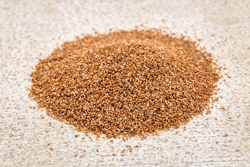Teff
About Teff
- Teff is a member of the Poaceae botanical family. This botanical family includes some of the most important food crops in the world including corn, wheat, rice, barley and millet.
- Teff is an ancient grain that originates from Africa, specifically the Ethiopia and Eritrea areas.
- Teff flour is traditionally used to make the fermented flat bread – injera – a staple in Ethiopian diet and culture.
- In the United States, teff is grown in western states such as Idaho, California, Texas and Nevada.
Purchasing, Storing and Preparing
- Purchase teff grains or teff flour year-round in the grocery store.
- Store grains in an airtight container for up to one year in the freezer or six months in the pantry.
- Store the flour in the freezer for up to six months.
- To prepare teff, first rinse and drain the teff grains using a fine sieve. Then bring 1 1/2 cups of water to a boil in a wide sauté pan. Add the teff grains and stir. Reduce heat to simmer, cover and cook until water is absorbed, around 8-10 minutes. Remove from heat and let sit covered for ten minutes. Fluff with a fork prior to serving.
- Use teff grains to make salads, add to soups or vegetarian loafs, or use as a creamy breakfast porridge. Use teff flour in your gluten-free baking recipes.
Nutrition Information
- Teff contains a powerhouse of beneficial nutrients.
 It is a good source of protein, iron, magnesium, thiamin and zinc and an excellent source of copper, phosphorus and manganese.
It is a good source of protein, iron, magnesium, thiamin and zinc and an excellent source of copper, phosphorus and manganese.
- Protein repairs and builds tissues, is important in growth and development, and is a building block of bones, muscles, cartilage, skin and blood.
- Iron assists with energy production, reproduction, growth and development, immune function, red blood cell formation, and wound healing.
- Magnesium helps to regulate blood pressure and blood sugar while also supporting bone formation, energy and immune system production, and hormone secretion.
- Zinc is involved in growth and development, immune and nervous system function, protein formation, wound healing and taste and smell function.
- Copper supports bone formation, collagen and connective tissue formation, energy production, iron metabolism and nervous system function.
- Phosphorus supports bone formation, energy production and storage and hormone activation.
- Manganese aids in cartilage and bone formation, wound health and metabolism of carbohydrates, protein and cholesterol.
- Thiamin converts food into energy and supports nervous system function.
Nutrition Facts
1/2 cup teff, cooked
Calories: 128 | Protein: 4.8 g | Fat: 0.8 g | Carbohydrate: 25 g | Fiber: 3.5 g | Calcium: 61.5 mg | Magnesium: 63 mg | Folate: 22.7 µg | Vitamin A: 2.5 IU | Potassium: 13.5 mg |
